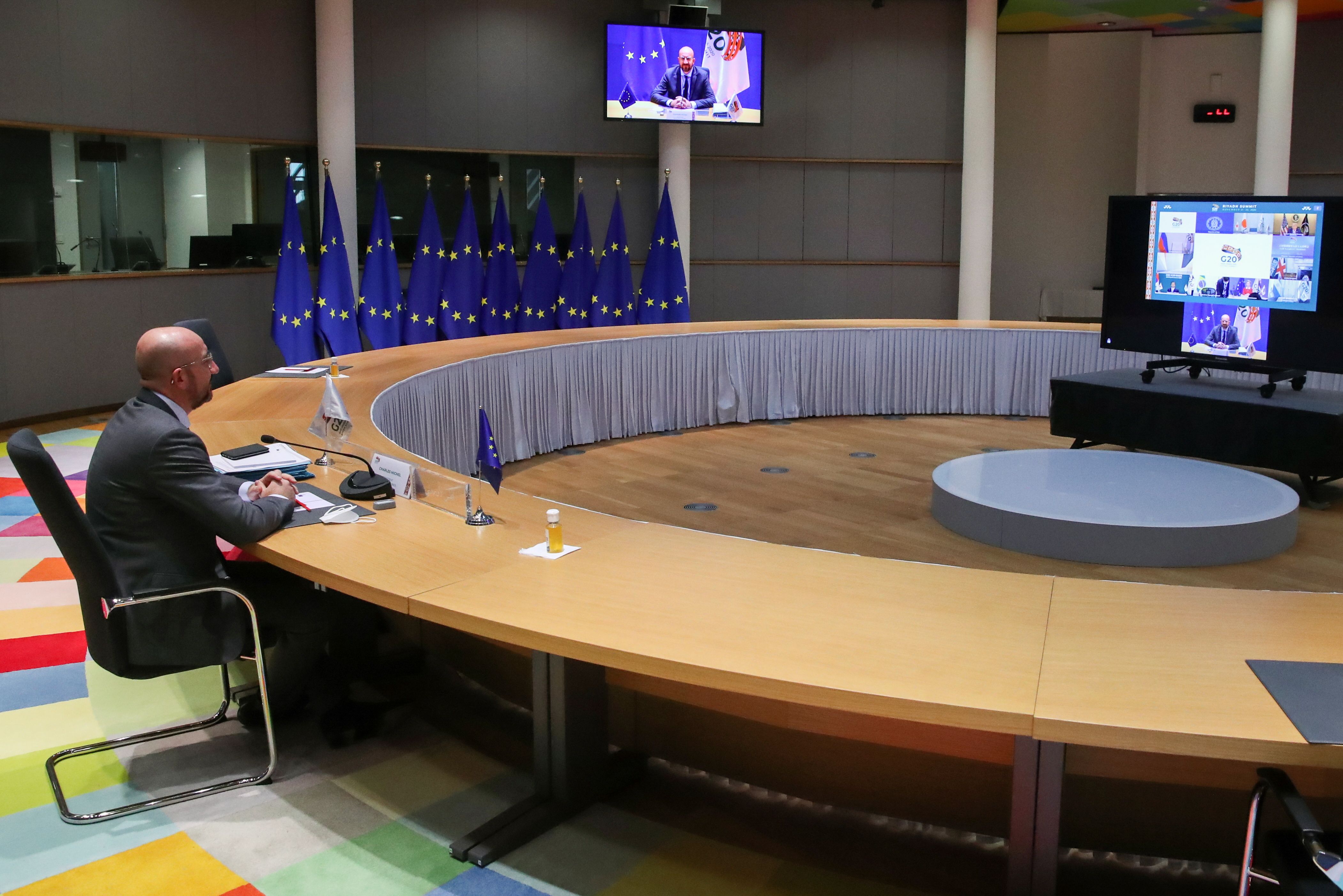Civic Attitudes Towards European Integration in the COVID-19 Era

Assessment
Public opinion polls conducted in the first months of the pandemic showed criticism of the Union’s activities. In a survey conducted at the end of April in nine Member States for the European Council on Foreign Relations (ECFR), only 22% of respondents agreed that the EU had lived up to its responsibilities, while 60% assessed their governments’ actions positively (though only 32% in Spain and 29% in France).
Later surveys, carried out after the European Commission presented a draft of the Next Generation EU recovery fund and after the peak of the spring infections in the majority of Member States, showed a turn in the Union’s favour. The Eurobarometer conducted in July and August found that those satisfied with the measures taken by EU institutions and their critics were almost evenly split (45% and 44%, respectively). Positive views dominate in Northern and Central Europe. However, in countries hardest hit by the pandemic (France, Italy, and Spain), and where trust in the EU was lowest already before the health crisis (Czechia and Greece), more than half of citizens are displeased with the institutions’ performance.
According to the same poll, citizens’ trust in the EU remained at the level recorded in autumn 2019 (43%), while trust in national governments increased considerably (from 34% to 40%). A less optimistic picture emerges from citizens’ assessment of the economic situation. As much as 64% of respondents hold a negative view of the economic condition of their country (an increase by 14 percentage points in relation to autumn 2019). Differences between Member States are very significant. In the south, a negative appraisal was expressed by over 80% of the interviewees. In Germany and Northern Europe, as well as in Poland, a majority still judge the economic situation as good.
“Yes” to Closer Cooperation
Even though the Union’s record is not seen as unequivocally positive, a clear majority of citizens believe that closer cooperation between Member States is the right reaction to the pandemic. Such a view was backed by 63% of respondents in the ECFR poll, and as many as 80% in Spain and 77% in Italy.
In a survey commissioned by the European Parliament (EP), done in late September and October, two-thirds of respondents agreed that the EU should have more competences to deal with crises such as a pandemic. This view enjoys particularly strong backing (75–87%) in the south, but it is not that widely held (45–57%) by the citizens of the “frugal countries” (Austria, Denmark, Finland, the Netherlands, and Sweden).
A similar pattern is manifest when citizens answer the question whether, due to the pandemic, the EU needs a larger budget (in the same survey for the EP). At the EU level, 54% back this idea, while 31% oppose it. The proponents are particularly numerous in Southern Europe, while in the “frugal countries” a majority reject the plea for more community spending (see Appendix). Social attitudes thus reflect government positions in budgetary negotiations. Interestingly, a majority of Slovak citizens are against a bigger budget, while in Czechia proponents and opponents are evenly split. In spring, several politicians in these states questioned the value of creating a generous recovery fund, pointing to shortcomings of the Southern European governments in economic policies and in countering the spread of the virus. The poll shows that this view is shared by a sizeable group of citizens. Among the Visegrad Group member countries, only in Poland do the supporters of a bigger budget constitute a large majority. Poles are also among the most euroenthusiastic societies when it comes to judging the EU record against COVID-19 (second among the Member States) and the general trust in the Union (fifth).
The Pandemic and Perception of EU Problems
COVID-19 has forced many citizens to modify their view of the hierarchy of challenges for the Union. In the Eurobarometer, the economic situation was revealed to be the main one: 35% of respondents mentioned it as one of the two most important issues facing the EU (an increase by 16 percentage points in comparison to autumn 2019). Immigration, which topped the ranking last autumn, was selected by 23% (a drop of 13 percentage points), while the same percentage of respondents indicated the state of Member States’ public finances. Health placed fourth (22%).
The economic situation was the only issue among the top three perceived challenges in all Member States. Its importance is relatively lowest in Central Europe where the recession is forecasted to be the least severe. In that region, immigration is considered the most important problem. Climate change features among the top three concerns in Northern and Western Europe. The state of Member States’ finances is viewed as vital by the Northern countries, but also in Czechia, Hungary, and Slovakia.
As regards priorities in the context of the fight against the pandemic, citizens indicate actions directly related to healthcare: developing financial means to find a vaccine (37%), establishing a strategy for facing similar crises (37%), and creating European health policy (30%). The latter is, however, not among the top three priorities in several states from Northern and Central Europe where some scepticism towards enlarging EU competences is visible (Austria, Czechia, Estonia, Finland, Ireland, Latvia, Slovakia, and Sweden). Less frequently mentioned were financial help for the most affected Member States (20%), investing in a sustainable recovery (19%), and enforcing stricter control of external borders (20%). Border protection is among the top three priorities in the Baltic States, Czechia, Hungary, and Slovakia.
Conclusions and Prospects
The increase in trust in national governments suggests that citizens see them as instrumental in the fight against the pandemic. Consequently, if the health crisis worsens, the governments, not the Union, are likely to become the main object of popular discontent. Yet, support for the EU could still suffer if projects that are strongly identified with the community, such as the recovery fund, which await the final approval of Member States and their parliaments, do not come to fruition.
Southern European societies, hardest hit by the pandemic both in the realm of health and economy, are the most supportive of granting the Union new competences and boosting its financial means. The citizens of Northern and Central Europe, on the other hand, are less enthusiastic about closer cooperation, most probably for fear that it could impose on them a disproportionate burden in favour of the South. These disparities constitute fertile ground for a revival of stereotypes of the helpless South and stingy North, which thrived during the financial crisis. However, the autumnal surge of the pandemic, which has affected Central Europe and some of the “frugal states” (including Austria and the Netherlands) much more severely than the spring wave, could yet provoke a turn in public moods: increase empathy with the South and expectations concerning the involvement of EU institutions.
Public support for enlarging the Union’s powers in crisis management, and for creating a common health policy, creates favourable circumstances for the proponents of deeper EU reform (including treaty change) at the forthcoming Conference on the Future of Europe. However, in the budgetary negotiations, the European Council considerably reduced the funds for the programme intended to promote cooperation on health care (EU4Health). Therefore, a bigger EU role in this realm, strongly promoted by the Commission, cannot be taken for granted.
Appendix
Figure 1. Assessment of EU measures against COVID-19
The South: France, Greece, Italy, and Spain; V4 (-PL): Czechia, Hungary, and Slovakia; The Frugals: Austria, Denmark, Finland, the Netherlands, and Sweden.
Source: author’s calculations based on “Standard Eurobarometer 93” (Summer 2020), answers to the question: “In general, how satisfied are you with the measures taken to fight the Coronavirus outbreak by the EU institutions?” Responses of “do not know” were not included.
Figure 2. Should the Union have more competences?
Source: author’s calculations based on the survey for the European Parliament “Public Opinion in the EU in Times of COVID-19” (3rd Survey) of affirmative answers to the question, “Should the EU have more competences to deal with crises such as the Coronavirus pandemic?” France was excluded as the level of support (64%) diverged from the rest of the Southern states.
Figure 3. Does the EU need a bigger budget?
Source: author’s calculations based on the survey for the European Parliament “Public Opinion in the EU in Times of COVID-19” (3rd Survey). Answers to the question: “Which of the following statements is closest to your opinion? A) the EU should have greater financial means to be able to overcome the consequences of the Coronavirus pandemic, B) the EU financial means are sufficient to be able to overcome the consequences of the Coronavirus pandemic”. France was excluded as the responses (53–27%) diverged from the rest of the Southern states.
Table 1. Key Challenges for the EU
Source: author’s calculations based on Standard Eurobarometer 93 (Summer 2020). Answers to the question: “What do you think are the most important issues facing the EU at the moment?” Respondent could mention a maximum of two issues.


